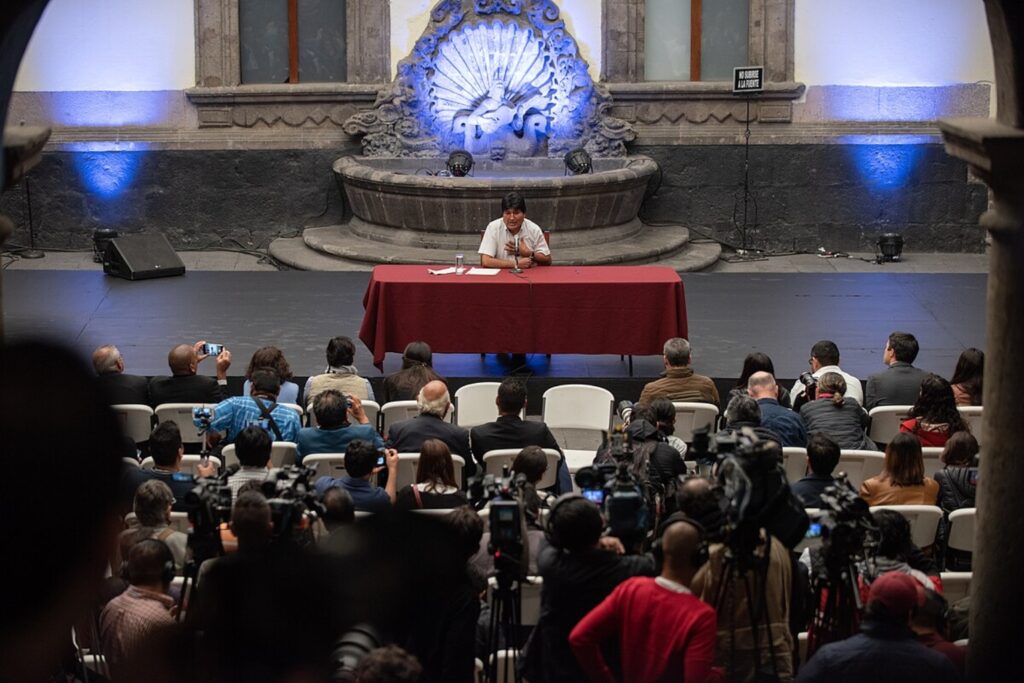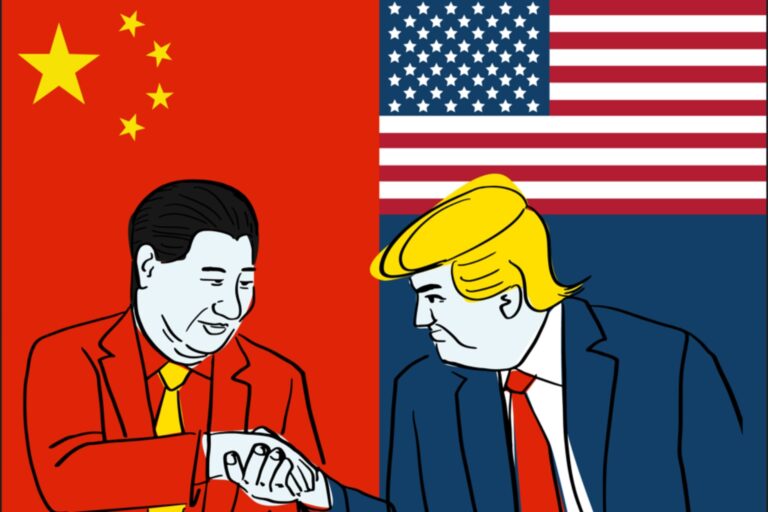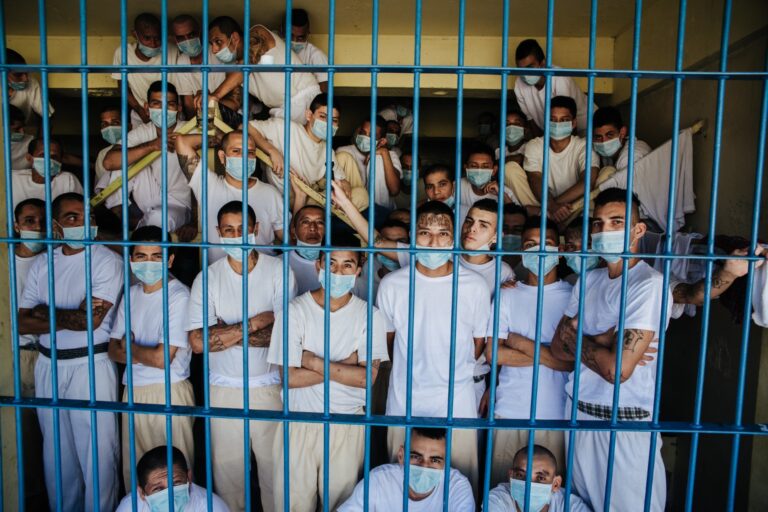Donald Trump is not the only populist former president in the Americas who has sought to return to office over the last four years. The leftist lighting rod Evo Morales has sought to engineer an equally unlikely political comeback in Bolivia. Last month marked the fifth anniversary of the electoral revolution-turned-coup ousting Morales, who fled into exile as his supporters and opponents were fighting in the streets of the capital La Paz.
Since 2019, Bolivia has managed to restore electoral democracy, one of only nine countries worldwide currently undergoing a “democratic U-turn.” Yet Bolivia has not achieved political stability and democratic deepening. In short, Bolivia’s democracy is stuck, plagued by endemic corruption, restricted press freedom, a politicized judiciary, weak rule of law, and divisions that threaten to tear apart the ruling Movement for Socialism (MAS) party.
What can we learn from the causes and consequences of Bolivia’s 2019 mass uprising? In short, civilian control of the military and mass mobilization for democracy are critical for re-democratization in the wake of democratic backsliding and electoral unrest. These factors help get democracy back on track, but do not guarantee further democratic gains.
The Causes of Bolivia’s 2019 Coupvolution
Bolivia’s 2019 “coupvolution” was the product of years of democratic backsliding, worsening political polarization, and anti-populist backlash. Bolivia experienced gradual democratic erosion under Evo Morales’ tenure between 2006 and 2019. According to V-Dem, Bolivia’s electoral democracy score dropped from 0.75 in 2005 to 0.6 by 2018 (on a 0 to 1 scale).
Morales, Bolivia’s charismatic first Indian president and a former coca-growers’ union leader, often employed populist rhetoric portraying elites as corrupt and blaming failed neoliberal policies from past administrations as the culprit for economic inequality. Morales initially focused on advancing his ‘pink’ agenda (i.e. land reform, nationalizing natural resources, advancing indigenous rights) and pushing through a new constitution by 2009. These policies were popular with his base in the indigenous western highlands, but intensified political opposition and sectional cleavages with wealthier eastern provinces.
With strong personal control over the MAS, which dominated parliament since 2009 and stacked the judiciary (thanks to judicial elections since 2011 with candidate judges vetted by Congress), Morales’ tenure was marked by increasing presidential hegemony and ‘neo-patrimonialism.’ He managed to evade term limits three times, first with the 2009 constitution, then with the support of a pliant Supreme Court in 2013 and the Constitutional Court in November 2017. The latter decision permitted Morales to stand in the 2019 elections, even though a February 2016 referendum had narrowly rejected an amendment to abolish term limits. By 2019, critics say Bolivia had slid into competitive authoritarianism.
The precipitating structural condition for the 2019 coupvolution was brewing popular opposition to democratic erosion. The trigger, however, were charges of election fraud in the October 20 elections by the MAS-dominated Supreme Electoral Tribunal (TSE) that would have prevented a run-off election. Those charges were lent credence by an OAS report of vote tabulation irregularities published on November 10. Though that OAS report was later found to contain serious flaws, it sparked a police mutiny and the army chief to publicly urge Morales to resign. Morales’ call for new elections with a new TSE offered a way out without breaking the constitutional system, but the momentum to oust Morales from power via extra-institutional means was unstoppable.
Restoring Bolivian Democracy after 2019
There was no telling that Bolivia’s re-democratization would be swift under the post-coup interim government of Jeanine Áñez. Nevertheless, in October 2020, new credible elections took place and Morales’ protégé and long-time finance minister, Luis Arce, handily won. Unlike post-coup governments from Sudan to the Sahel, which have clung to power in recent years, Bolivia’s conservatives were unwilling or unable to block the MAS victory. Instead, there was a peaceful transition of power back to the MAS only a year after Morales’ ouster.
After dipping to 0.48 in 2019 and a post-coup low of 0.33 in 2020, Bolivia’s electoral democracy index rebounded to its pre-2019 revolution level of 0.6 in 2021. What accounts for Bolivia’s relatively rapid re-democratization after the 2019 democratic breakdown?
The first necessary step for quick re-democratization was ensuring civilian control over the armed forces. Bolivia has a long history of military intervention in politics, being the world’s most coup-prone country until its democratic transition in 1982. From 1943 to 1982, Bolivia yo-yoed between military juntas and civilian dictatorships. Yet in 2019, even though elements in the armed forces defected from Morales, refusing to repress protestors and backing revolutionary demands, Bolivia’s military made no attempt to impose military rule. Prior to 2019, the last successful military coup in Bolivia dated to 1981, the era of military rule. The political crisis of 2019-2020 was principally waged by civilians and politicians. During the Cold War, an ‘interim’ military junta would have seized power, not civilians.
The second important factor for re-democratization was mass mobilization and protests by indigenous MAS supporters. These protests initially forced the conservative interim government to strike an agreement in December 2019 with MAS legislators, promising new elections and pledging not to disenfranchise MAS voters. Even though the Áñez government made it clear Morales was persona non grata, barring him from running for a Senate seat in 2020, they were compelled to negotiate. After Áñez twice delayed the elections – citing the COVID pandemic – MAS supporters mobilized to ensure elections were not delayed a third time. Protests and strikes by the MAS-aligned main workers union and campesino movement shut the country down in August 2020, which forced Áñez to negotiate and sign a law promising elections by October 2020. Áñez’s efforts to build a conservative competitive authoritarian regime foundered on resistance.
The Legacy of Bolivia’s 2019 Coupvolution
During Arce’s term in office, it has proved easier to restore the formal democratic machinery than to overcome other democratic deficits plaguing Bolivia. As the August 2025 elections approach, a major fissure within MAS has emerged between supporters of Arce – who has his own political ambitions for re-election – and supporters of Morales, who returned from exile in late 2020 and declared his candidacy for the presidency in September 2023. At the end of last year, the Constitutional Court reversed its 2017 decision scrapping term limits, effectively barring Morales from running for a fourth term in 2025.
After an apparent coup attempt this June by General Juan José Zúñiga, Morales initially rallied behind Arce but the split re-emerged quickly. Morales accused Arce of staging the coup attempt as a means to gain political support. Amidst a deepening economic crisis, with the country inching closer to a debt default—thanks to rising inflation, a dollar shortage, and decreasing domestic reserves—Morales supporters in Congress have blocked Arce from selling more debt or selling lithium mining rights to alleviate fiscal pressures.
Tensions have only heated up this fall. Rival groups of supporters have clashed. Since mid-October, Morales’ supporters have created blockades around the country, demanding an end to a revived investigation into a statutory rape allegation against Morales from 2015. This week, prosecutors issued an arrest warrant for Morales for “human trafficking involving a minor.” Morales denounced Arce for being behind a “brutal judicial war” against him.
The risk of renewed political violence in the run-up to the 2025 elections is real. In late October, Morales accused the Arce government of attempted assassination after his vehicle was struck with bullets. Arce condemned political violence and called for an investigation of the shooting. In November, Morales began a hunger strike in a bid to force the Arce government into a dialogue. Morales supporters then seized a military post in Cochabamba, seizing weapons and ammunition, and holding some 200 soldiers hostage.
Support for democracy in Bolivia is also increasingly conditional, according to Latinobarometer data. Though a slight majority of Bolivians still support democracy as preferable to authoritarian alternatives—a figure that has not changed much across surveys from 2018, 2020, or 2023—the percentage of Bolivian respondents saying they “would not mind a non-democratic government in power if it could solve economic problems and provide jobs” increased from around one-third in 2016 to 54% in 2023. But the economy won’t save Bolivia’s democracy.
Despite clouds on the horizon, there is still time for cooler heads to prevail and avoid a second coupvolution. Civil society and regional actors such as the OAS can play a constructive role in bolstering electoral institutions and facilitating political dialogue. Keeping Bolivia’s military in the barracks and mass mobilization nonviolent will be the key to ensuring Bolivia’s democratic U-turn over the last five years does not veer off the tracks.
Works Cited
Angiolillo, Fabio, Martin Lundstedt, Marina Nord, and Staffan I. Lindberg. 2024. “State of the World 2023: Democracy Winning and Losing at the Ballot.” Democratization, April, 1–25. https://doi.org/10.1080/13510347.2024.2341435.
AFP. “Bolivia’s Morales slame ‘brutal judicial war’ after warrant issue.” France 24, December 17, 2024, https://www.france24.com/en/live-news/20241217-bolivia-s-morales-slams-brutal-judicial-war-after-warrant-issued.
AP News. “Bolivia’s government accuses supporters of ex-President Evo Morales of taking 200 soldiers hostage.” Associated Press, November 3, 2024, https://apnews.com/article/bolivia-protests-evo-morales-luis-arce-investigation-2087c408a202b591f5e0f806cf57c18f.
Arana Araya, Ignacio. “The ‘Big Five’ Personality Traits of Presidents and the Relaxation of Term Limits in Latin America.” Democratization 29, no. 1 (2021): 113–32. https://doi.org/10.1080/13510347.2021.1957838.
BBC. “Bolivian army chief urges Morales to step down.” BBC, November 10, 2019, https://www.bbc.com/news/world-latin-america-50369591.
BBC. “Bolivia’s ex-leader Evo Morales barred from senate run.” BBC, September 8, 2020, https://www.bbc.com/news/world-latin-america-54071409.
BBC. “Bolivian ex-President Evo Morales returns from exile.” BBC, November 9, 2020, https://www.bbc.com/news/world-latin-america-54872827.
BBC. “Bolivian ex-leader’s looming arrest warrant triggers protests.” BBC, October 15, 2024, https://www.bbc.com/news/articles/cn5znlzrv97o.
Blair, Laurence, and Cindy J. Bercerra. “Is Bolivia’s ‘interim’ president using the pandemic to outstay her welcome?” The Guardian, June 1, 2020, https://www.theguardian.com/global-development/2020/jun/01/bolivia-president-jeanine-anez-coronavirus-elections.
Blair, Laurence, and Cindy J. Bercerra. “Bolivia protesters bring country to standstill over election delays.” The Guardian, August 9, 2020, https://www.theguardian.com/world/2020/aug/09/bolivia-protesters-bring-country-to-standstill-over-election-delays-covid-19-evo-morales.
Brown, Rich. “In Bolivia, an “Intense” Battle Between Arce and Morales.” Americas Quarterly, May 30, 2024, https://www.americasquarterly.org/article/in-bolivia-an-intense-battle-between-arce-and-morales/.
The Carter Center. 2021. “Analyzing Bolivia’s 2020 General Elections.” The Carter Center, https://www.cartercenter.org/resources/pdfs/news/peace_publications/election_reports/bolivia-2020-final-report.pdf.
CBS News. “Bolivia’s ousted leader Evo Morales flees “coup” into exile, leaves chaos in his wake.” CBS News, November 12, 2019, https://www.cbsnews.com/news/bolivia-evo-morales-flees-coup-exile-mexico-leaves-chaos-in-his-wake-today-2019-11-12/.
Chin, John J., David B. Carter, and Joseph G. Wright. “The varieties of coups d’état: Introducing the Colpus dataset.” International Studies Quarterly 65, no. 4 (2021): 1040-1051
Chin, John J., and Joseph Wright. “Can Bolivia Ever Escape the Coup Trap?” Journal of Democracy, June 2024, https://www.journalofdemocracy.org/online-exclusive/can-bolivia-ever-escape-the-coup-trap/.
Civicus. 2020. “Two weeks of barricades in Bolivia after presidential election postponed to October 2020.” Civicus. https://monitor.civicus.org/explore/two-weeks-barricades-bolivia-after-presidential-election-postponed-october-2020/.
Collyns, Dan. “Bolivian police in La Paz join ‘mutiny’ against Evo Morales.” The Guardian, November 9, 2024, https://www.theguardian.com/world/2019/nov/09/bolivian-police-in-la-paz-join-mutiny-against-evo-morales.
Devia-Valbuena, Nicolás. 2024. “Can Bolivia Avoid Renewed Election Violence in 2025?” United States Institute of Peace. https://www.usip.org/publications/2024/06/can-bolivia-avoid-renewed-election-violence-2025.
Driscoll, Amanda, and Michael J. Nelson. “Judicial Selection and the Democratization of Justice: Lessons from the Bolivian Judicial Elections.” Journal of Law and Courts 3, no. 1 (2015): 115–48. https://doi.org/10.1086/679017.
Fain, Egor, Leonid Issaev, and Andrey Korotayev. “Coupvolution as a Mechanism of Regime Change in the Sahel.” In Perspectives on Development in the Middle East and North Africa (MENA) Region, 133-150. Springer, Cham, 2024. https://doi.org/10.1007/978-3-031-53429-4_7.
Farthing, Linda. “Bolivia: The Left in Power.” Transnational Institute, October 2, 2018, https://www.tni.org/en/publication/bolivia-the-left-in-power.
Farthing, Linda. “Bolivia has been promised elections. But will they be fair?” The Guardian, December 2, 2019, https://www.theguardian.com/commentisfree/2019/dec/02/bolivia-elections-democracy-president-jeanine-anez.
Ferrari, Ana L. 2020. “The Future of Bolivia’s Democracy.” Varieties of Democracy. https://v-dem.net/weekly_graph/the-future-of-bolivia-s-democracy.
Frantz, Erica, Andrea Kendall-Taylor, and Joseph Wright. The Origins of Elected Strongmen: How Personalist Parties Destroy Democracy from Within. (Oxford University Press, 2024) https://doi.org/10.1093/oso/9780198888079.001.0001.
Geddes, Barbara, Joseph Wright, and Erica Frantz. “Autocratic breakdown and regime transitions: A new data set.” Perspectives on politics 12, no. 2 (2014): 313-331.
Haggard, Stephan, and Robert Kaufman. “The Anatomy of Democratic Backsliding.” Journal of Democracy 32, no. 4 (2021): 27-41. https://dx.doi.org/10.1353/jod.2021.0050.
Janetsky, Megan. 2024. “Bolivian president orchestrated a ‘self-coup,’ political rival Evo Morales claims.” AP News, July 1, 2024, https://apnews.com/article/bolivia-coup-accusation-arce-morales-b0051f5a98fdd7ec5ba212bbe49d9850.
Janetsky, Megan, and Paola Flores. “Economic turmoil in Bolivia fuels distrust in government and its claim of a ‘failed coup.’” AP News, July 1, 2024, https://apnews.com/article/bolivia-economy-distrust-arce-morales-cdb4672eb26c68d130df924fa2913403.
Karita, Juan, and Isabel Debre. “Bolivia’s Evo Morales tells AP he’ll press on with a hunger strike until his rival accepts dialogue.” AP News, November 3, 2024, https://apnews.com/article/morales-bolivia-political-crisis-president-arce-protests-8f14b568425ee257ff5d454b7fbc5a7c.
Larry Diamond, “How to End the Democratic Recession.” Foreign Affairs, October 22, 2024. https://www.foreignaffairs.com/world/how-end-democratic-recession-autocracy-larry-diamond
Latinobarometer Corporation. 2023. “Latinobarometer Report 2023: The democratic recession of Latin America.” https://www.latinobarometro.org/lat.jsp.
Lehoucq, Fabrice. “Bolivia’s Citizen Revolt.” Journal of Democracy 31, no. 3 (2020): 130-144. https://dx.doi.org/10.1353/jod.2020.0050.
Mainwaring, Scott, and Aníbal Pérez-Liñán. “Why Latin America’s Democracies Are Stuck.” Journal of Democracy 34, no. 1 (2023): 156-170. https://dx.doi.org/10.1353/jod.2023.0010.
News Wires. “Bolivian court rules that former president Morales cannot seek re-election.” France 24, December 30, 2023 https://www.france24.com/en/americas/20231230-bolivian-court-rules-that-former-president-morales-cannot-seek-re-election.
O’Boyle, Brendan. “Who is Bolivia’s President Luis Arce? Former economist survives coup attempt.” Reuters. June 27, 2024, https://www.reuters.com/world/americas/who-is-bolivias-president-luis-arce-former-economist-survives-coup-attempt-2024-06-27/.
Peñaranda, Raúl. 2024. “Bolivia Is a Warning for Mexico’s Judicial Reform.” Americas Quarterly. https://www.americasquarterly.org/article/bolivia-is-a-warning-for-mexicos-judicial-reform/.
Pérez-Liñán, Aníbal, Nicolás Schmidt, and Daniela Vairo. 2019. “Presidential Hegemony and Democratic Backsliding in Latin America, 1925–2016.” Democratization 26 (4): 606–25. https://doi.org/10.1080/13510347.2019.1566321.
Pion-Berlin, David, and Igor Acácio. “The Return of the Latin American Military?” Journal of Democracy 31, no. 4 (2020): 151-165. https://dx.doi.org/10.1353/jod.2020.0062.
Ramos, Daniel, and Monica Machicao. “Bolivia’s Morales accuses government of trying to kill him after car hit by bullets.” Reuters, June 27, 2024, https://www.reuters.com/world/americas/bolivias-morales-says-vehicle-fired-upon-amid-rising-political-tension-2024-10-27/.
Reporters Without Boarders. n.d. “Bolivia.” RSF. https://rsf.org/en/country/bolivia.
Reuters. “Bolivian court clears way for Morales to run for fourth term.” Reuters, November 28, 2017, https://www.reuters.com/article/us-bolivia-politics/bolivian-court-clears-way-for-morales-to-run-for-fourth-term-idUSKBN1DS2ZX/.
Reuters. 2023. “Evo Morales announces candidacy for 2025 Bolivia presidential elections.” Reuters, September 24, 2023, https://www.reuters.com/world/americas/evo-morales-announces-candidacy-2025-bolivia-presidential-elections-2023-09-24/.
Riaz, Ali, and Md Sohel Rana. “Bolivia: A Miracle Turning into a Competitive Autocracy.” In How Autocrats Rise. Global Political Transitions, 83-112. Singapore: Palgrave Macmillan, 2024. https://doi.org/10.1007/978-981-99-7580-8_6.
Rodriguez, Francisco R., and Jake Johnston. “OAS Continues to Dodge Accountability for Actions in the 2019 Bolivian Election.” Center for Economic and Policy Research, August 18, 2022, https://cepr.net/oas-continues-to-dodge-accountability-for-actions-in-the-2019-bolivian-election/.
Santos, Sofia F., and Thomas Mackintosh. “Bolivia military post taken over and soldiers held hostage.” BBC, November 2, 2024, https://www.bbc.com/news/articles/c937kekx3nqo.
Transparency International. n.d. “2023 Corruption Perceptions Index.” Transparency International. https://www.transparency.org/en/cpi/2023/.
Valdez, Carlos, and Isabel Debre. “Bitter political fight in Bolivia is paralyzing the government as unrest boils over economic crisis.” AP News, June 23, 2024, https://apnews.com/article/bolivia-morales-arce-political-economic-crisis-d38051e051a2e6473a18133e4a9c6120.
Velasco Guachalla, V. Ximena, Calla Hummel, Sam Handlin, and Amy Erica Smith. “Latin America Erupts: When Does Competitive Authoritarianism Take Root?” Journal of Democracy 32, no. 3 (2021): 63-77. https://dx.doi.org/10.1353/jod.2021.0034.
Welch, Claude. “Bolivia: The Consequences of Partial Revolution.” In No Farewell to Arms?, Taylor & Francis Group, 2019. https://www.taylorfrancis.com/chapters/mono/10.4324/9780429043765-4/bolivia-consequences-partial-revolution-claude-welch?context=ubx&refId=a17b6c80-3ddf-4df6-86f8-172cd02edbb2.
Weyland, Kurt. 2024. “Opposition to Populist Backsliding: Conditions, Limitations, and Opportunities.” Democratization, September, 1–26. https://doi.org/10.1080/13510347.2024.2405127.
World Justice Project. n.d. “WJP Rule of Law Index.” World Justice Project. https://worldjusticeproject.org/rule-of-law-index/global/2024/Bolivia/Constraints%20on%20Government%20Powers/historical.
Zambrano, Diego A., Ludmilla Martins da Silva, Rolando Garcia Miron, and Santiago P. Rodríguez. “How Latin America’s Judges are Defending Democracy.” Journal of Democracy 35, no. 1 (2024): 118-133. https://dx.doi.org/10.1353/jod.2024.a915353.




